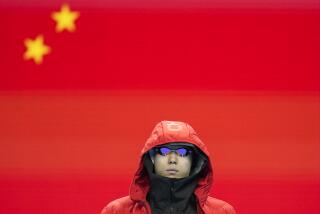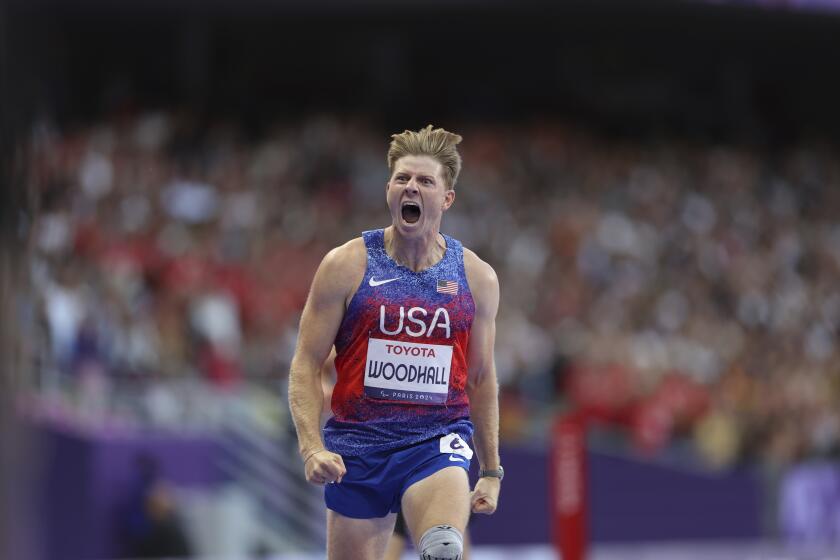USOC Official Made Big Demand
SYDNEY, Australia â The U.S. Olympic Committeeâs former director of anti-doping programs, Dr. Wade Exum, offered at the beginning of this year to resign his post, claim he did so for âpersonal reasonsâ and not sue the USOC on condition that it pay him $5.5 million, sources told The Times on Friday.
The USOC declined to accept that offer. Six months later, Exum resigned, charging as he left that he could no longer abide working at the USOC because it was âdeliberately encouraging the doping of athletes.â
Exum, who is African American, also charged that he had become a âracial token.â
A month later, in July, he filed a lawsuit in Denver federal court against the USOC making the same allegations. Senior officials of the USOC, based in Colorado Springs, Colo., have denied wrongdoing.
Norm Blake, the USOCâs current CEO, and Scott Blackmun, formerly the USOCâs general counsel and now its senior managing director for sports resources, confirmed the $5.5-million demand.
One of Exumâs attorneys, John Pineau of Denver, said the two sides had settlement talks before the filing of the lawsuit.
Speaking on condition of anonymity, several sources said that the demand was made on Exumâs behalf by attorneys only weeks after the USOC voted last fall to establish an independent drug-testing agency, the United States Anti-Doping Agency. That action jeopardized his position as the USOCâs director of drug control, a job heâd held since 1991.
As part of a proposed deal, his attorneys also sought from the USOC an agreement that the $5.5-million payment would be kept confidential.
Blackmun said that the USOC never seriously considered paying Exum $5.5 million. A payment that might avert litigation was weighed, but, Blackmun said, âWe were nowhere near that number.â
Blake said of Exum: âOn the one hand, he says heâs standing for a matter of principle. On the other hand, he is willing to accept some form of financial accommodation. I leave that to anyoneâs scrutiny as to what the implications of those conflicting positions are.â
Exum responded: âThe new USADA agency that they handed my job to, they committed $24 million to that agency--$24 million! I think that if I were after money, Iâd ask them for that job.â
Pineau asserted that the USOCâs âfailure to run an ethical program . . . forced us into a situation where money damages are the only remedy available.â
USADA, to be headed by chairman Frank Shorter--the 1972 Olympic marathon champion--and CEO Terry Madden, has been scheduled to take over out-of-competition testing of U.S. athletes Monday, the day after the close of the Sydney Games, which have been marked by a series of drug controversies.
Among them was the disclosure by the International Olympic Committeeâs drug chief, Prince Alexandre de Merode of Belgium, that U.S. shotputter C.J. Hunter had tested positive four times this year for the banned steroid nandrolone.
Hunter--husband of sprinter and long jumper Marion Jones, who has won two gold medals and a bronze in Sydney--has denied knowingly ingesting nandrolone. There have been no reports linking Jones to the use of performance-enhancing substances.
News of Hunterâs four failed tests, confirmed only after leaks to the media, prompted intense scrutiny this week of U.S. doping-control policies, with particular attention focused on USA Track and Field.
Asked repeatedly if positive drug tests have been suppressed, USA Track and Field CEO Craig Masback has said no.
He also said his agency is bound by U.S. confidentiality laws and rules preventing the disclosure of names of athletes who test positive until due process has run its course.
IOC officials urged USA Track and Field to disclose all test results. White House drug policy director Barry McCaffrey also called for a thorough and public accounting of tests.
In court in Denver, meantime, Exumâs attorneys this week filed a USOC document detailing 5,355 drug tests in 1999. Of those, 207, or 3.8%, turned up positive.
Of the 207, only 10 prompted suspensions.
Most of the positive tests, 158 of 207, were for âstimulants,â a category that includes an asthma medication--salbutamol--that athletes are allowed to take if they obtain a waiver.
Track and field yielded the highest number of positives--33 of the 207. None led to a suspension. Several cases, however, were still pending.
With all that as prelude, Masback suggested Friday after a meeting with IOC Vice President Dick Pound of Canada that USA Track and Field turn its entire doping control problem over to the World Anti-Doping Agency. WADA was created last year by the IOC to operate independently, overseeing the various groups that police sports.
Pound, who now heads WADA, backed Masbackâs idea and said it should be extended to all countries and all sports.
âUltimately, thatâs probably the best way for all this to be played out--that all testing, for all national and international federations and national Olympic committees, be handled by an independent third party,â Pound said.
It was immediately unclear how such a proposal might affect USADA.
USATF also announced Friday that it will form a special panel to review its drug-testing procedures.
Both Masback and Blake said that no U.S. athletes competing in the Sydney Games had failed drug tests.
Hunter, who qualified for the U.S. Olympic team, underwent arthroscopic knee surgery Sept. 3 and withdrew from the team Sept. 11, four days before the Games began.
More to Read
Go beyond the scoreboard
Get the latest on L.A.'s teams in the daily Sports Report newsletter.
You may occasionally receive promotional content from the Los Angeles Times.







